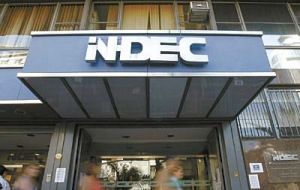MercoPress. South Atlantic News Agency
Fifth year running Argentine economy grows above 8%

Argentina's GDP expanded 8.7% in 2007, after having grown 9.1% in the fourth quarter, up 1.9% from the previous quarter announced Thursday in Buenos Aires the country's Statistics and Census Office, Indec.
This means that 2007 was the fifth year running that the Argentine economy is growing at over 8% rates: 8.8% in 2003; 9% in 2004; 9.2% in 2005 and 8.5% in 2006. Unrevised data showed that the Argentine economy momentum continued in January with a 10.1% expansion over a year ago. However given the controversy surrounding Indec's handling of the consumer prices index and other inflation related surveys, private sector sources believe the real growth was half a point less, 8.2%, particularly since inflation has been "grossly underestimated". Indec inflation was below 10% in 2007 but the private sector and international organizations believe it was in the range of 17 to 20%. Official fourth quarter data shows gross domestic investment up by 17.7%, compared to the same period in 2006, which is made up of 10.5% in construction and 29.4% in durable equipments. President Cristina Fernandez de Kirchner earlier this week announced that the Central Bank international reserves had reached a record 50 billion US dollars. "This seemed impossible, almost magic but we have reached 50 billion and we should be proud", said the Argentine president adding that it's a "strong shield against the international economy turbulences". The accumulation of reserves in Argentina has been achieved by global demand and record prices for commodities, plus the country's policy of keeping the Peso pegged to the US dollar, thus helping to boost exports. This policy is contrary to most of other Latinamerican countries that have seen their currencies soar against the ailing US dollar and has been criticized by the IMF that recommends greater exchange rates flexibility. In a release the Argentine Central Bank said that the accumulation of reserves with an "anti-cyclical" purpose is done under "strict control of monetary equilibriums to as to guarantee for the first time in decades, monetary, financial and exchange stability". Contrary to past experiences the increase in reserves is not because of greater indebtedness but as a result of "a 10 billion US dollars trade surplus and a current account surplus equivalent to 3% of GDP" This policy (accumulation of reserves and fixed low exchange rate) have protected the real economy and insulated the country from abrupt financial and monetary changes, --"as are happening in the world"-- which would have generated inflation and hurt the overall economy. "The Central Bank fire power has been used to discourage market speculations and reduce uncertainty in economic sectors", underlined the release. Argentina's international reserves reached a historic record in April 2007 with 37.4 billion US dollars, beating the previous 37.38 billion of 2001, just before the melting of the economy when reserves plunged to less than 9 billion. Private analysts estimate the country's reserves will reach 58 billion US dollars by the end of 2008.




Top Comments
Disclaimer & comment rulesCommenting for this story is now closed.
If you have a Facebook account, become a fan and comment on our Facebook Page!